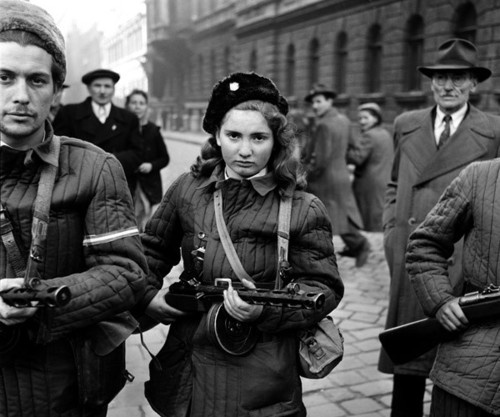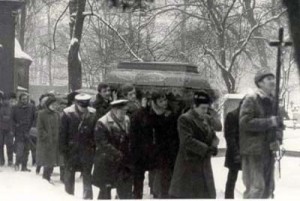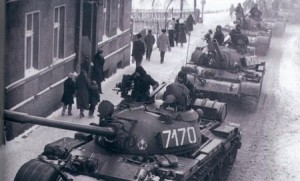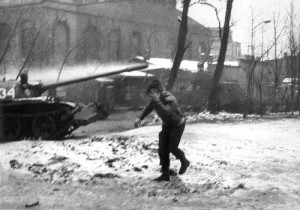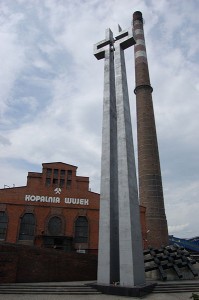This is, or was, Erika. She was a young student who was a real revolutionary. She and thousands of other brave Hungarians came out onto the streets of Budapest in 1956 to demonstrate against the communists who ran the puppet regime that governed Hungary on behalf of the Russian Soviet Union. She holds a gun because the regime’s secret police tried to break the demonstrations. When the Russian Red Army, flying the hammer and sickle flag carried by Romany Blythe, moved in to crush the uprising, Erika and her friends fought against their tanks with rifles, sub machine guns and petrol bombs.
They failed.
The Red Army’s hammer and sickle was triumphant and a new puppet communist regime brought back the secret police, the execution blocks and the prison camps. Erika was dead, killed in the last hours of the fighting while trying to help her wounded comrades. The dead hand of communist dictatorship gripped Hungary and the rest of Eastern Europe once again.
Western governments accepted the iron grip of Communism in Eastern Europe and Russia as a fact of life to be accommodated. Many voices in western academic and cultural circles, being of a Marxist bent, celebrated it.
Margaret Thatcher and Ronald Reagan were the first western leaders to publicly denounce those communist regimes as evil and oppressive and, by implication, illegitimate. At a time when internal stresses and strains were beginning to distort the social and economic fabric of these tyrannies the impact of external condemnation from such influential voices were important factors in causing the red regimes to implode.
And in October 1989, 33 years after the uprising, Hungary became a free multi party democracy. How sad that Erika could not have been in the crowds celebrating that moment but, no doubt ,her spirit, and those of all those other courageous freedom fighters who died with her, was smiling down from above.
What would Erika have made of Romany Blythe’s theatrical posturing and ghoulish disrespect of Margaret Thatcher?
Not much, I suspect.
Probably with as much contempt as Lech Walesa and those of his Solidarity comrades who had welcomed her to Gdansk in 1988 when it was still under communist rule.
Those on the Left who still probably regard Thatcher as a hate-figure, have either forgotten the history of the Cold War or possibly never understood that Communism meant the virtual enslavement of millions of people in the East European countries, who loathed its ideology as much as Margaret Thatcher herself. It is simply not possible to imagine Thatcher visiting Russia in the 1930s, like certain Left-wing useful idiots from Britain, and being taken in by Stalin’s propaganda machine. Ordinary East Europeans took a different view of her to her critics in this country. For them she symbolised opposition to Communism; indeed she was given a tumultuous welcome by the shipyard workers in Gdansk when she visited them. She wept at the sight. The shipyard workers would have been puzzled to learn of the refusal of Oxford University, her old alma mater and one of the most prestigious universities in the world, to give her an honorary degree.
Amen to that, say I – and I am sure the spirit of Erika would agree….
